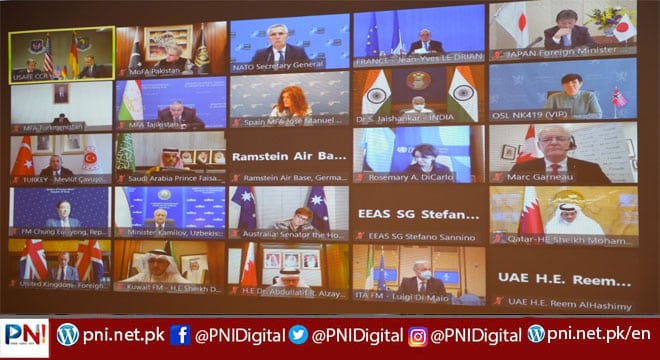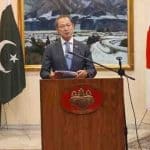Excellencies,
Distinguished delegates,
I welcome you all to this first Ministerial meeting of Afghanistan’s neighbors.
Let me, at the outset, express my deep appreciation for your positive response to our proposal for a regional approach on the situation in Afghanistan.
I also thank our Special Representatives/Envoys who worked hard to lay a strong foundation for our meeting.
I am positive that our deliberations, today, will be productive.
Excellencies,
We are meeting at a pivotal moment in Afghanistan’s history.
The events of the past few weeks have catapulted our region to a global spotlight. How the situation evolves will have profound implications for Afghanistan, our region, and the world at large.
It is clear that no one could anticipate the recent turn of events. — from the meltdown of security forces to the collapse of the Afghanistan government.
All previous assessments and predictions proved wrong.
Notwithstanding the un-anticipated and sudden nature of these developments, it is important to note that the much dreaded bloodshed has not occurred.
The prospect of a protracted conflict and civil war seems to have been averted.
The much-feared exodus of refugees has not taken place, at least thus far.
By all reckonings, the situation remains complex and fluid.
One thing, however, is certain: We all are grappling with a changed reality in Afghanistan.
The Taliban have announced formation of a caretaker setup. We have noted this development.
We hope that the political situation stabilizes at the earliest, leading to normalcy.
The new situation requires discarding old lenses, developing new insights, and proceeding with a realistic and pragmatic approach.
At the center of our endeavors must remain the well-being of the Afghan people, who have suffered enormously due to conflict and instability for over 40 years.
Excellencies,
On 18 August 2021, I had a detailed exchange of views with State Councilor and Foreign Minister Wang Yi.
We agreed that in view of the developments taking place in Afghanistan, which had obvious implications for all the six neighbors, it was important to have closer communication and coordination.
During 24-26 August 2021, I undertook visits to Tajikistan, Uzbekistan, Turkmenistan and Iran.
I am grateful that we had in-depth and insightful discussions during that trip.
We agreed on charting a way forward that would help address the common challenges and realize the opportunities that may arise out of the latest developments.
Our consultations, so far, have brought forth the following issues that would require a coordinated approach, as the situation evolves:
• Security situation along the borders
• Prevention of Afghan soil from being used by terrorist entities
• Possibility of fresh influx of refugees
• Containing drug trafficking and transnational crimes
• Stemming any spread of extremist elements
• Challenges relating to COVID-19 pandemic
• Impediments to regional connectivity
We also agree that there are rich dividends if peace is secured in Afghanistan. These could include:
• Secure borders
• End of threat of terrorism from Afghan soil
• Possibilities of return of refugees
• Economic stability and improvement in living standards
• Realization of connectivity projects
• Enhanced regional economic integration
Excellencies,
To advance our common vision of a peaceful, stable, prosperous and inter-connected region, Afghanistan must be enabled to get through this testing time and realize its full potential.
In our view, there are several key principles and priorities that should guide the efforts in this direction:
First, we must affirm our full support and solidarity with the Afghan people.
Second, we must reaffirm our full commitment to the unity, sovereignty and territorial integrity of Afghanistan.
Third, we must stress that Afghan issues should have Afghan solutions.
Fourth, we must make clear that Afghan soil should not be allowed to be used against any country.
Fifth, we must underscore the multi-ethnic nature of Afghan society and stress the importance of national reconciliation. In the wake of recent developments, the key priorities are to prevent a humanitarian crisis that can exacerbate the sufferings of the Afghans.
Equally important is to take steps to prevent economic meltdown in the country. If a humanitarian crisis is prevented and economic stability is assured, then peace can be consolidated and a mass exodus precluded.
It cannot be stressed enough that this requires enhanced engagement of the international community, particularly at this pivotal juncture. Renewed diplomatic and international presence in the country would reassure the Afghan people.
The urgent provision of humanitarian assistance, with UN and its various agencies playing a lead role, would reinforce that process of confidence-building. Afghanistan’s access to its financial resources would be pivotal in preventing a collapse and reviving the economic activity.
Excellencies,
I have no doubt that our deliberations today would help us carry forward our collective thinking on a coordinated approach to the myriad aspects of the situation in Afghanistan. We propose to transform this important platform of neighboring countries into a regular consultative mechanism.
I also suggest that we may give consideration to the idea to invite Afghanistan in future. Participation of Afghanistan will augment this forum’s effectiveness in pursuing our shared objectives for lasting peace and stability in Afghanistan. The neighboring countries have a direct stake in the stability in Afghanistan.
Our collective voice to the international community will reinforce our message of a peaceful, stable and prosperous Afghanistan, at peace with itself and with its neighbors.
I thank you all.
Follow the PNI Facebook page for the latest news and updates.









